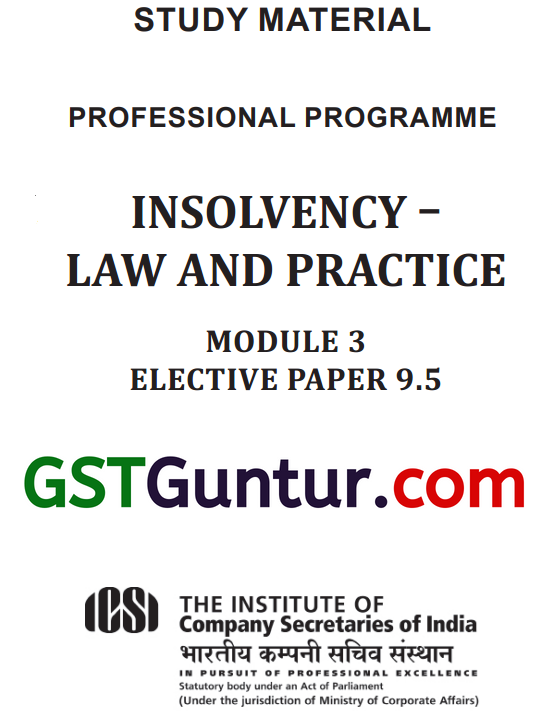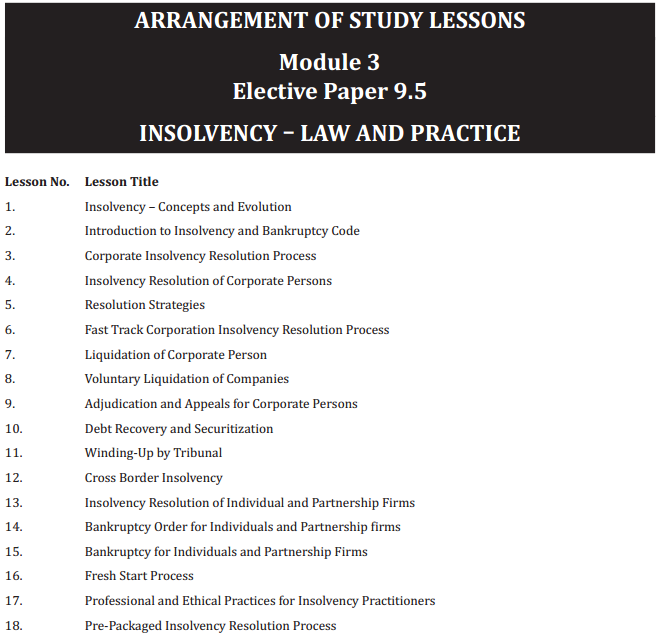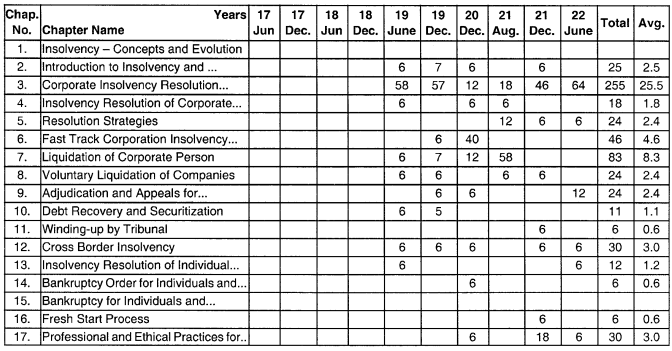CS Professional Insolvency Law and Practice Notes Study Material Important Questions
- Chapter 1 Insolvency Concepts and Evolution
- Chapter 2 Introduction to Insolvency and Bankruptcy Code
- Chapter 3 Corporate Insolvency Resolution Process
- Chapter 4 Insolvency Resolution of Corporate Persons
- Chapter 5 Resolution Strategies
- Chapter 6 Fast Track Corporation Insolvency Resolution Process
- Chapter 7 Liquidation of Corporate Person
- Chapter 8 Voluntary Liquidation of Companies
- Chapter 9 Adjudication and Appeals for Corporate Persons
- Chapter 10 Debt Recovery and Securitization
- Chapter 11 Winding-Up by Tribunal
- Chapter 12 Cross Border Insolvency
- Chapter 13 Insolvency Resolution of Individual and Partnership Firms
- Chapter 14 Bankruptcy Order for Individuals and Partnership Firms
- Chapter 15 Bankruptcy for Individuals and Partnership Firms
- Chapter 16 Fresh Start Process
- Chapter 17 Professional and Ethical Practices for Insolvency Practitioners

CS Professional Insolvency Law and Practice Syllabus

CS Professional Insolvency Law and Practice Chapter Wise Weightage

Professional Programme Module 3
Elective Paper 9.8 Insolvency – Law and Practice (Max. Marks 100)
Syllabus
Objective
To acquire expert knowledge of the legal, procedural, and practical aspects of Insolvency and its resolution.
Detailed Contents
1. Insolvency – Concepts and Evolution: Bankruptcy/Insolvency– the Concept; Historical Developments of Insolvency Laws in India; A Brief on Historical Background on UK Insolvency Framework; US Bankruptcy Laws.
2. Introduction to Insolvency and Bankruptcy Code: Historical Background; Report of the Bankruptcy Law Reforms Committee, Need for the Insolvency and Bankruptcy Code, 2016; Overall scheme of the Insolvency and Bankruptcy Code; Important Definitions; Institutions under Insolvency and Bankruptcy Code, 2016.
3. Corporate Insolvency Resolution Process: Legal Provisions; Committee of Creditors; Procedure; Documentation; Appearance; Approval.
4. Insolvency Resolution of Corporate Persons: Contents of the resolution plan; Submission of the resolution plan; Approval of resolution plan.
5. Resolution Strategies: Restructuring of Equity and Debt; Compromise and Arrangement; Acquisition; Takeover and Change of Management; Sale of Assets.
6. Fast Track Corporation Insolvency Resolution Process: Applicability for fast track process; Time period for completion of fast track process; Procedure for fast track process.
7. Liquidation of Corporate Person: Initiation of Liquidation; Powers and duties of Liquidator; Liquidation Estate; Distribution of assets; Dissolution of the corporate debtor.
8. Voluntary Liquidation of Companies: Procedure for Voluntary Liquidation; Initiation of Liquidation; Effect of Liquidation; Appointment; Remuneration; Powers and duties of Liquidator; Completion of Liquidation.
9. Adjudication and Appeals for Corporate Persons: Adjudicating Authority in relation to insolvency resolution and liquidation for corporate persons; Jurisdiction of NCLT; Grounds for appeal against the order of liquidation; Appeal to Supreme Court on the question of law; Penalty of carrying on business fraudulently to defraud traders.
10. Debt Recovery and Securitization: Non-performing assets; Asset Reconstruction Companies [ARC]; Security Interest (Enforcement) Rules, 2002; Options available with banks e.g. SARFAESI, DRT, etc., Application to the Tribunal/Appellate Tribunal.
11. Winding-Up by Tribunal: Introduction; Is winding up and dissolution synonymous? Winding up under the Companies Act, 2013; Powers of the Tribunal; Fraudulent preferences.
12. Cross Border Insolvency: Introduction; Global developments; UNCITRAL Legislative Guide on Insolvency Laws; UNCITRAL Model Law on Cross Border Insolvency; US Bankruptcy Code; World Bank Principles for Effective Insolvency and Creditor Rights; ADB principles of Corporate Rescue and Rehabilitation; Enabling provisions for cross border transactions under IBC, Agreements with foreign countries.
13. Insolvency Resolution of Individual and Partnership Firms: Application for insolvency resolution process; Procedural aspects; Discharge order.
14. Bankruptcy Order for Individuals and Partnership firms: Bankruptcy if insolvency resolution process fails; Application for bankruptcy; Conduct of meeting of creditors; Discharge order; Effect of the discharge order.
15. Bankruptcy for Individuals and Partnership Firms: Background; Overview of the provisions; Adjudicating Authority; Appeal against the order of DRT; Appeal to Supreme Court.
16. Fresh Start Process: Background; Application for fresh start order; Procedure after receipt of application; Discharge order.
17. Professional and Ethical Practices for Insolvency Practitioners: Responsibility and Accountability of Insolvency Practitioners; Code of Conduct; Case laws; Case Studies; and Practical Aspects.
